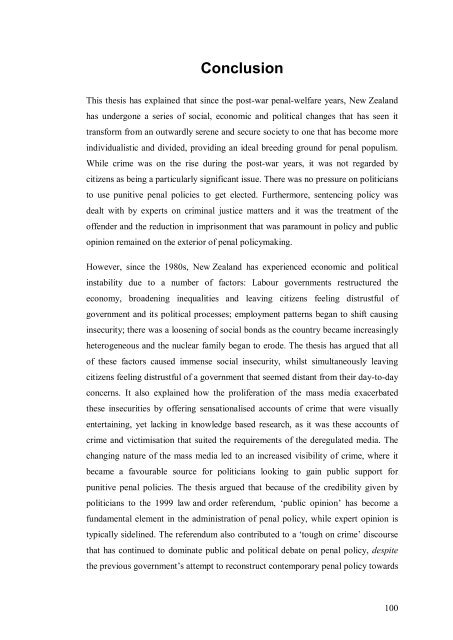By Tess Bartlett - Rethinking Crime and Punishment
By Tess Bartlett - Rethinking Crime and Punishment
By Tess Bartlett - Rethinking Crime and Punishment
You also want an ePaper? Increase the reach of your titles
YUMPU automatically turns print PDFs into web optimized ePapers that Google loves.
ConclusionThis thesis has explained that since the postwar penalwelfare years, New Zeal<strong>and</strong>has undergone a series of social, economic <strong>and</strong> political changes that has seen ittransform from an outwardly serene <strong>and</strong> secure society to one that has become moreindividualistic <strong>and</strong> divided, providing an ideal breeding ground for penal populism.While crime was on the rise during the postwar years, it was not regarded bycitizens as being a particularly significant issue. There was no pressure on politiciansto use punitive penal policies to get elected. Furthermore, sentencing policy wasdealt with by experts on criminal justice matters <strong>and</strong> it was the treatment of theoffender <strong>and</strong> the reduction in imprisonment that was paramount in policy <strong>and</strong> publicopinion remained on the exterior of penal policymaking.However, since the 1980s, New Zeal<strong>and</strong> has experienced economic <strong>and</strong> politicalinstability due to a number of factors: Labour governments restructured theeconomy, broadening inequalities <strong>and</strong> leaving citizens feeling distrustful ofgovernment <strong>and</strong> its political processes; employment patterns began to shift causinginsecurity; there was a loosening of social bonds as the country became increasinglyheterogeneous <strong>and</strong> the nuclear family began to erode. The thesis has argued that allof these factors caused immense social insecurity, whilst simultaneously leavingcitizens feeling distrustful of a government that seemed distant from their daytodayconcerns. It also explained how the proliferation of the mass media exacerbatedthese insecurities by offering sensationalised accounts of crime that were visuallyentertaining, yet lacking in knowledge based research, as it was these accounts ofcrime <strong>and</strong> victimisation that suited the requirements of the deregulated media. Thechanging nature of the mass media led to an increased visibility of crime, where itbecame a favourable source for politicians looking to gain public support forpunitive penal policies. The thesis argued that because of the credibility given bypoliticians to the 1999 law <strong>and</strong> order referendum, ‘public opinion’ has become afundamental element in the administration of penal policy, while expert opinion istypically sidelined. The referendum also contributed to a ‘tough on crime’ discoursethat has continued to dominate public <strong>and</strong> political debate on penal policy, despitethe previous government’s attempt to reconstruct contemporary penal policy towards100
















